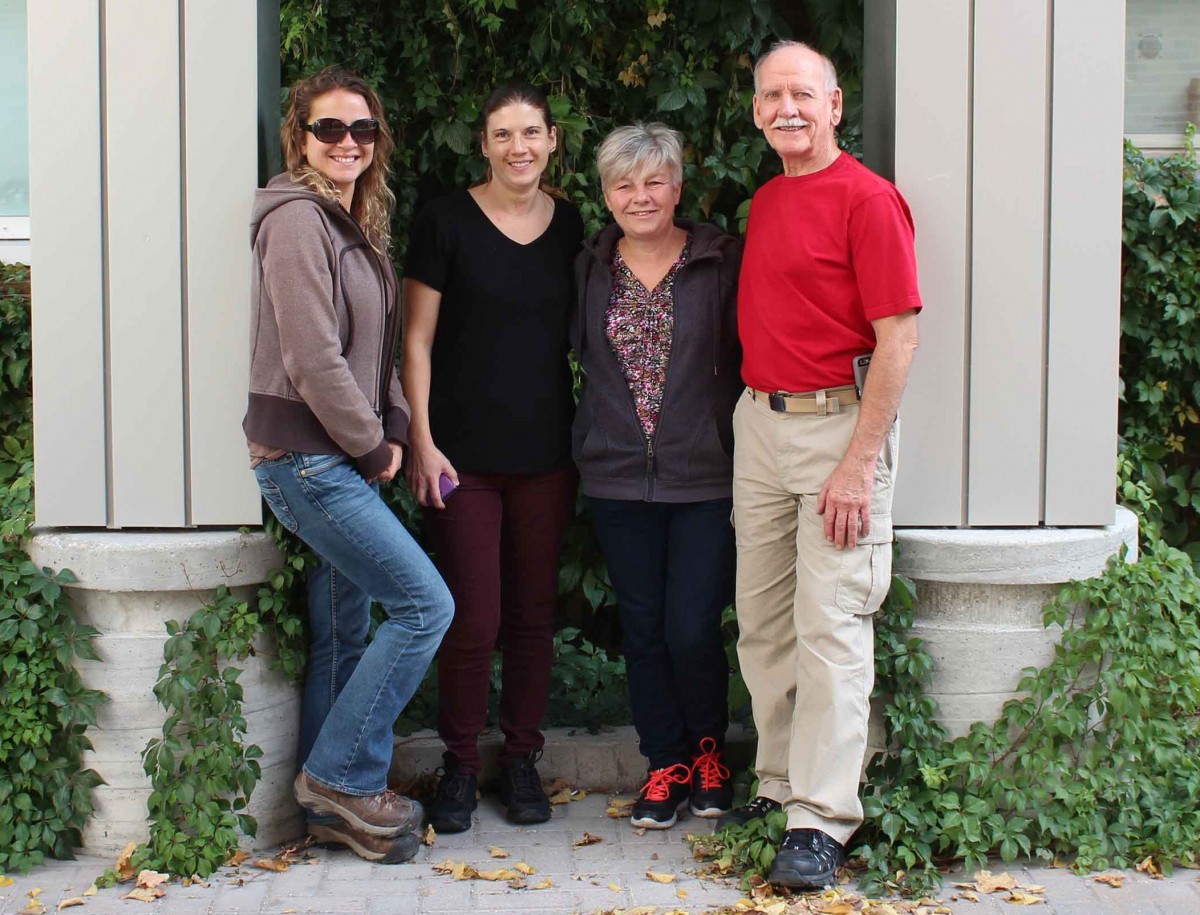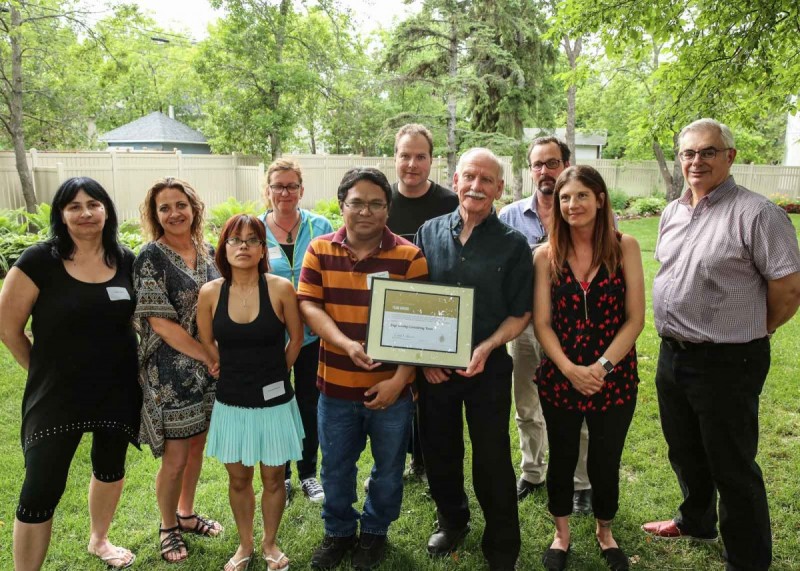
Shawna Pfeffer, Angela Bacher, Bozena Szul and Peter Allan, four members of the caretaking team that won one of the Team Awards at the 2016 Awards of Excellence. // Photo by Mariianne Mays Wiebe
Make things easier for others — and more team-building tips
Caretaking team on their 2016 Team Award
Caretakers: They are the stewards of our buildings and the navigators of the university. They clean and repair and know every place inside out; they have all the keys. They also interact with most everyone on campus on a daily basis, especially staff and faculty.

The winning Engineering Caretaking Team with President Barnard at the President’s Reception in June.
UM Today spoke with Shawna (Reuther) Pfeffer, Peter Allan, Angela Bacher and Bozena Szul, members of the 14-person engineering team of caretakers that won the Team Service Award at this year’s Awards of Excellence. The four have over 65 years of service among them.
None of them knew “what a big deal” the award was before they were nominated. Suddenly, says Shawna Pfeffer, “everyone’s talking about it — signs are going up.” She’s completing her family social sciences degree and has been with the University of Manitoba for over five years.
They thought what they did was just an everyday thing — the norm. But receiving the award “opened our eyes to how we were viewed by the Engineering people,” says Allan. “It was kind of out of the blue for us that we got nominated … and then to be chosen was great.”
“People show their appreciation in many ways … but it was nice to get that formal recognition,” says Szul. “This was a big one.”
‘The people make the job’
All had thoughts about what keeps their work enjoyable: the diversity of tasks, the ability to set one’s own schedule and some autonomy in how they do the work. They agree, however, that the people — the community — make the job.
Peter Allan has a special connection with the people in Engineering, he says, as his background is legal land surveying and civil engineering. He was looking for something more active after years of sitting behind a desk, and says he “bonded quite quickly with the people in Engineering, both the other workers and people [we] are working for. It goes beyond what happens here — it’s sort of like an extended family.” He’s been at the U of M since January 2004.
“It’s nice to have people stop you to say ‘hi,’ to ask what you’re doing for the weekend,” agrees Angela Bacher, who’s been here 18 years, along with her husband, Dave Bacher, who works in physical plant and has been here even longer.
Bozena Szul says that the people help keep the work both interesting and gratifying. Before she started the job 30 years ago, she was taking English classes at the university after immigrating to Canada from Poland. Caretakers feel included in the university community, she says. She remembers a year when her husband went back to Poland for Christmas, and people invited her to spend Christmas with them.
Pfeffer also appreciates the people, including that opportunity to interact with those from different walks of life, as part of a community. “You’ve got artists, scientists, teachers and students — so many different personalities and cultures. It’s a great exposure to a lot of different things.”
And, she says, “You get to know the people in your area. When you are in a specific area, you see the same people every day, you get that kind of relationship, where people stop to tell you about their day and their lives.
“It’s a bit like being the neighbourhood hairdresser or bartender.”
Tips on good teamwork
By members of the Engineering caretaking team, winners of the 2016 Team Award
1. Be positive. “That’s really important when it’s teamwork because you have a lot of different personalities on a team,” says Pfeffer. “And sometimes you are doing things that aren’t fun — cleaning up after a flood; no one likes being ankle deep in water. It’s cold, it’s wet, it’s yukky. So you start making jokes. Keep it light.”
2. Make things easier for others. “You might deal with people who are stressed or lost, and helping them to see the situation in an easier way,” says Szul. “[You can tell them] ‘You will get used to it, you will know where to go.’ I remember when I started, wondering, ‘Where do I go now?’ Doing this together and understanding what someone’s weaknesses are. Help each other. We work as a team for everyone we serve.”
3. Share ideas and expertise. Let someone else take the lead. “We’re all at the same job, and all have different ways of doing it,” adds Pfeffer. “Sometimes you have to let someone else’s idea win and give that a try. Sometimes back up and let someone else take the lead.”
4. It’s about building relationships, rapport, respect and cooperation. “Usually the workload is split up in terms of people’s strengths and weaknesses. It’s constantly evolving, because you learn from each other and grow,” says Allan. It’s important, he adds, to have “good rapport and communication with the staff. It makes things easier. Without that, our job would be difficult — so it’s required.”
5. Working together is uplifting, says Bacher. “Working on your own all the time is less fun, so it’s important to appreciate it.”






